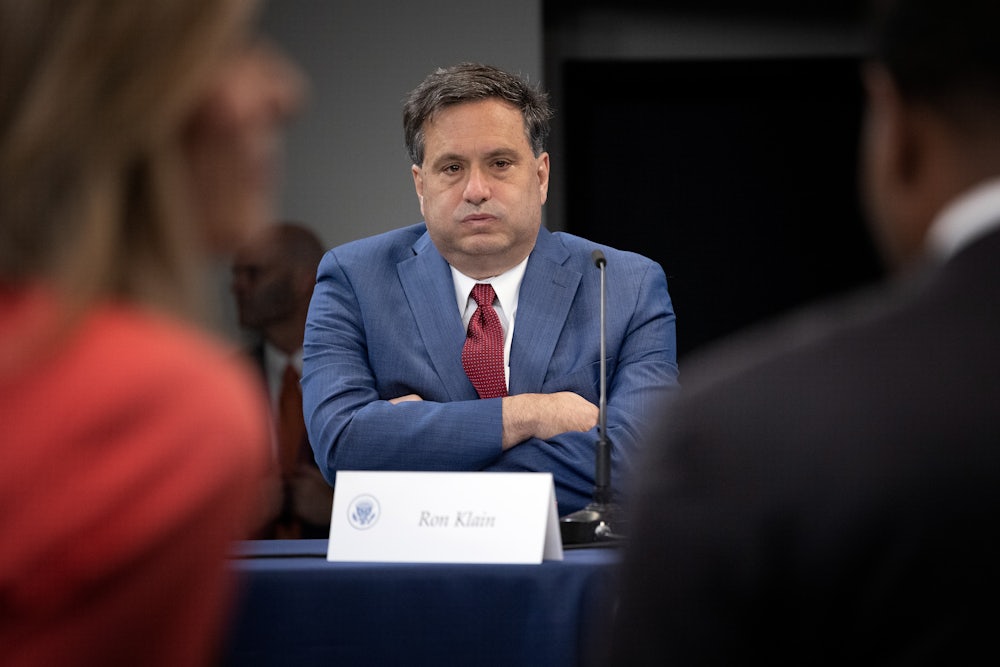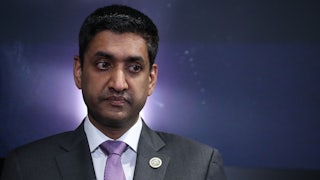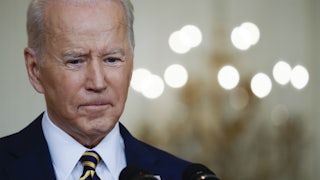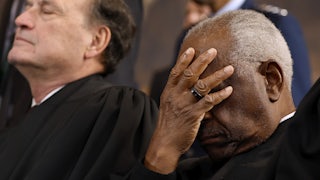As President Biden and his White House team round the one-year anniversary of their time in office, there’s been a persistent question floating around Washington political circles: What to make of chief of staff Ron Klain’s time in the job?
There has been a spate of deeply reported stories from major news outlets assessing the performance of Klain, a longtime Biden loyalist who was the subject of many a glowing profile back when Biden was riding higher in the polls. I’ve encountered similar questions and discussions in my own reporting on other stories and various Washington political circles, both among Republicans and Democrats. Biden has tamped down any speculation that he would like to replace one of his closest and most senior aides. When he was asked about Klain at a recent press conference, the president was clear.
“I’m satisfied with the team,” Biden said.
The administration has taken steps to protect Klain from any entrenched perception that his time as chief of staff has complicated or hindered Biden’s agenda. It has made available for these stories—including this one—some top aides who otherwise never talk to the press. The line from the White House, plainly put, is that Klain isn’t singly responsible for any of the administration’s ongoing troubles, and that switching him out wouldn’t actually fix anything and could actually cause more problems and trigger panic.
Klain’s ongoing presence is, at the least, somewhat of a stabilizing force. The alternative would only call into question whether the Biden team actually believed their assurances that they have everything under control and the country just needs to follow their steady hand. In any field, when an important employee leaves, people end up wondering if there’s something seriously wrong with the employer. That’s what would happen if Klain left right now, and the repercussions could hurt the American economy, Democrats’ already grim prospects in the midterms, and Americans’ trust in the federal government’s guidance on Covid-19.
Some of this discussion is par for the course. When a presidency isn’t going well, a press corp in search of a story line inevitably starts looking at personnel, and the chief of staff is the obvious first target. The Trump administration saw similar stories as the then-president plowed through about as many chiefs of staff in one term as President Obama had in two terms. One of those chiefs of staff, John Kelly, had a whole team working to fight any negative public perception that could hurt him in internal factional wars.
The situation is not that severe for Klain. Veterans of the chief of staff job concede that it’s been a tumultuous first year, from trying to corral all 50 Democratic senators to passing Biden’s domestic policy agenda to battling Republican lawmakers on Covid. Things may get even rockier in the coming days as this White House rushes to fill a new vacancy on the Supreme Court and Senate Republicans sharpen their knives.
“They’ve had a rough few weeks, but you still want him to be the leader. He’s not just experienced, he’s strategic,” John Podesta, a former chief of staff for Bill Clinton, said. “He’s someone who can say ‘no’ to Biden.”
The intrigue about Klain is partially rooted in his close ties to progressives. From the earliest days of the Biden administration, he’s been known as a vital conduit between the White House and the progressive community—activist groups on issues like climate change and more left-leaning Democrats on the Hill. It’s easy to see how, from the outside, one would think that Klain’s corner of the Democratic Party is the progressive wing of the party, while other longtime inner-circle Biden aides, like White House counselor Steve Ricchetti, handle moderates or other slices of the Democratic Party pie.
“They tend to split up responsibilities in the White House, and I think he’s spent more time being assigned to some of the more progressive groups,” one moderate Democratic congressman told me. “So I think there’s a perception that whether it’s because of his social media, or whatever, he has more ties to the progressive side. But his job is to talk to everybody, I think that’s what he does.”
White House officials stressed that there’s no member of Biden’s innermost circle who deals with just one part of the party. Every senior member of the team deals with all corners of the Democratic Party, they argue. Klain himself has longtime ties with well-known centrist Democrats like Congressman Josh Gottheimer. As another example, he’s been a regular texter with Senator Amy Klobuchar.
“It’s just simply not true that there’s some HOV lane,” White House legislative affairs director Louisa Terrell said on Wednesday. Terrell, who rarely talks to the press, was made available by the White House for this story.
Those healthy ties do not include Senator Joe Manchin. In recent days there has been reporting that there are ongoing tensions between Manchin and Klain. The Washington Post reported that Klain was involved in crafting and moving a statement critical of Manchin after the West Virginia senator refused to back Biden’s Build Back Better social spending packages and that Manchin’s ongoing frustration’s with Biden’s team is rooted mostly in Klain.
That tension highlights a key aspect of the chief of staff job at the White House. It’s a job about juggling multiple crises and getting very little—if any—credit for success and plenty of blame for failures.
“When they don’t get something, no one blames the boss. No one blames Biden. You don’t see Manchin trashing Biden. Manchin trashes Klain. You don’t see the Progressive Caucus bitching about Biden because they’ve got to deal with him. They bitch about the staff,” Jim Messina, a former Obama administration deputy chief of staff, said. “Look, the nature of the White House chief job is you’re going to be the person that tells everyone no. It’s not going to be Joe Biden, it’s going to be you, and you’re going to have to be the one that makes the unpopular decisions.”
So a news cycle or two focusing on Klain was inevitable. That’s part of the job, former chiefs of staff stressed to me.
“I think it’s the annual, obligatory blame-the-chief game that’s going on. It happens every time. The White House chief of staff—it’s a 24-7, unforgiving, thankless job,” said Chris Whipple, who wrote the preeminent book on White House chiefs of staff, The Gatekeepers: How the White House Chiefs of Staff Define Every Presidency. “James Baker used to say the White House chief walks around with a target on his front, not his back. Rahm Emanuel said those aren’t the only parts. Jack Watson, Jimmy Carter’s chief, compared the job to being a javelin catcher. I think that’s what’s going on here. I think that Biden’s got lots of problems right now, but Ron Klain is not one of them.”
There is an end date for Klain in the job. Former chiefs of staff estimated to me that the average lifespan in the job is about 18 months. And replacing an incumbent isn’t always a cure-all. It wasn’t for the Obama administration or the Trump administration, and it won’t be for this administration. When chief of staff changes do happen, it’s usually used as a blunt tool to try and demonstrate something publicly.
“Ronald Reagan’s swapping of James Baker for Don Reagan was the most disastrous chief of staff job swap ever made,” Whipple recalled. “It resulted in the Iran-Contra affair. Iran-Contra would never have happened on Baker’s watch.”
Bill Daley, another former Obama chief of staff, was more direct about the idea of replacing Klain. “I think any talk about Ron Klain being pushed out or leaving is ridiculous! It’s been a year. Come on,” Daley said. “It’s something to talk about because [people are] tired of talking about Build Back Better. I don’t know.”
That may be. But the scrutiny Klain will face over the next few months, ahead of the 2022 midterms, will only intensify. The White House has to install a new Supreme Court justice. It is planning to more forcefully sell its big accomplishments—the bipartisan infrastructure deal and the Covid relief package. And it’s going to be taking another swing at finally passing Build Back Better. Klain will be central to all of that. White House officials and veterans know even if there was a desire to bring in a new chief of staff, it wouldn’t make any of the real pressing concerns of this administration go away. The strategy for this White House, instead, is to stick together and focus. Klain’s time in the barrel will likely pass.








